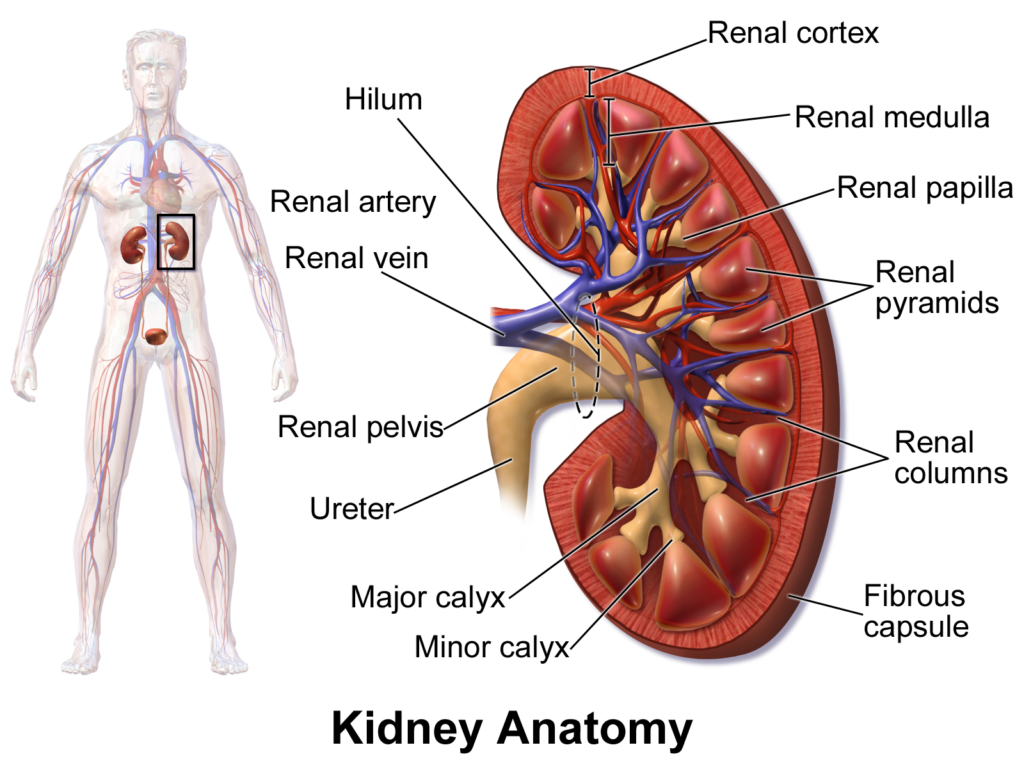The kidneys are two bean-shaped organs located on either side of the spine, just below the ribcage. They are an essential part of the urinary system and play a vital role in maintaining the overall health and balance of the body.
The kidneys function by filtering the blood, removing waste products, and excess fluid from the body. They also help to regulate blood pressure, balance electrolytes, and produce hormones that stimulate the production of red blood cells and control calcium metabolism.

The renal artery brings blood to the kidney, which is then filtered by the nephrons – the functional unit of the kidney. Each kidney contains about a million nephrons, which are responsible for filtering the blood and removing waste products. The filtered blood then leaves the kidney through the renal vein, and the waste products are excreted in the form of urine.
In addition to filtering waste products, the kidneys also play a crucial role in regulating electrolyte balance in the body. Electrolytes such as sodium, potassium, and chloride are necessary for the proper functioning of cells and organs. The kidneys help to maintain the right balance of these electrolytes in the blood, which is essential for the proper functioning of the body.
The kidneys also help to regulate blood pressure. When blood pressure is too high, the kidneys produce a hormone called renin, which causes the blood vessels to narrow, thereby reducing blood pressure. This is why people with high blood pressure are often prescribed medications that inhibit the production of renin.
The kidneys also play a role in the production of red blood cells. They produce a hormone called erythropoietin, which stimulates the bone marrow to produce red blood cells. When the kidneys are not functioning correctly, there may be a decrease in the production of erythropoietin, which can lead to anaemia.
Kidney disease is a significant health issue worldwide, affecting millions of people. Chronic kidney disease (CKD) is a condition in which the kidneys gradually lose their ability to function correctly over time. It is often asymptomatic in the early stages, which is why it is sometimes referred to as a “silent killer.”
There are several causes of kidney disease, including high blood pressure, diabetes, and autoimmune disorders. Other factors that can contribute to kidney disease include obesity, smoking, and a diet high in sodium and sugar.
Symptoms of kidney disease may include fatigue, loss of appetite, difficulty sleeping, muscle cramps, and swelling in the legs and feet. In advanced stages, kidney disease can lead to complications such as heart disease, stroke, and kidney failure.
Treatment for kidney disease depends on the underlying cause and severity of the condition. Lifestyle changes, such as dietary modifications and regular exercise, can help to prevent and manage kidney disease. Medications such as blood pressure and cholesterol-lowering drugs may also be prescribed.
In some cases, kidney disease may progress to the point where dialysis or kidney transplantation is necessary. Dialysis is a procedure that filters the blood outside the body, while a kidney transplant involves replacing the damaged kidney with a healthy one from a donor.
In conclusion, the kidneys are vital organs that play a crucial role in maintaining the overall health and balance of the body. They are responsible for filtering waste products, regulating electrolyte balance, and producing hormones that help to regulate blood pressure and the production of red blood cells. Kidney disease is a significant health issue that can lead to complications such as heart disease, stroke, and kidney failure. By making lifestyle changes and seeking appropriate medical care, it is possible to prevent and manage kidney disease and maintain kidney health.











